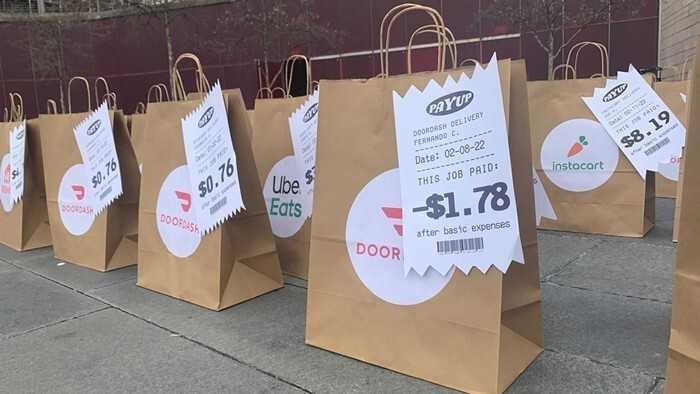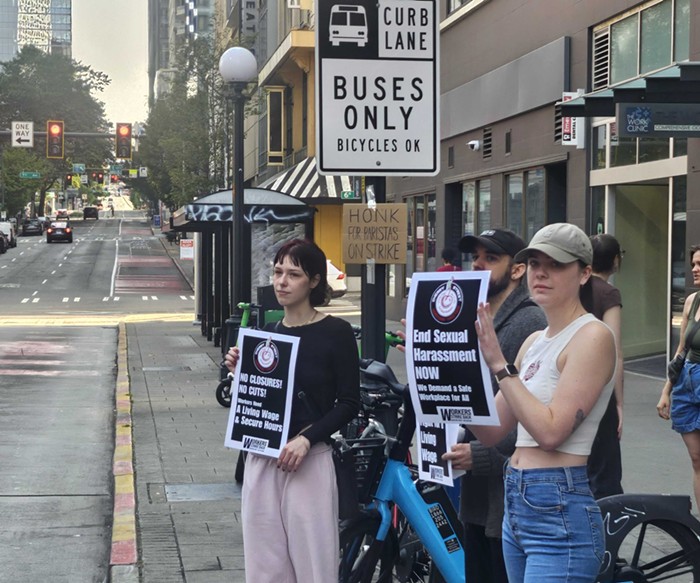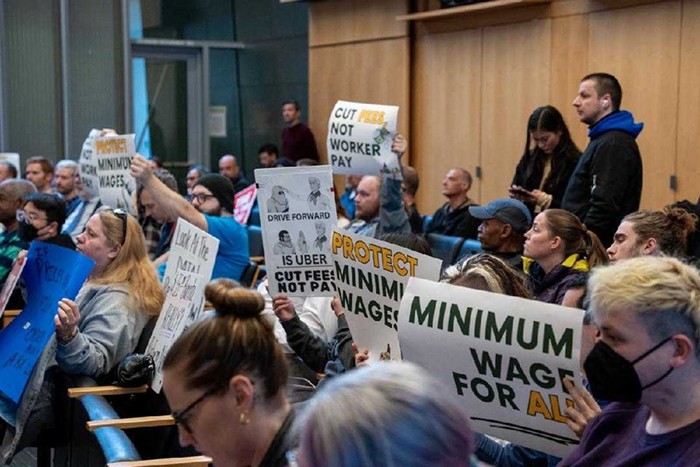Time is running out for the Seattle City Council to tank Council Member Sara Nelson’s minimum wage repeal for gig delivery workers. In a Thursday committee meeting, Council Members Bob Kettle and Rob Saka reigned in Nelson’s sweeping attack on worker’s rights, but their amendments don’t change the fact that the underlying legislation puts the profits of big business over the livelihood of working people. The bill still cuts wages to potentially $6 below the City minimum wage and fails to cap the retaliatory delivery fees that the gig companies leveraged to manufacture this rollback in the first place.
But workers: Don’t despair yet. The most labor-friendly of the otherwise corporate-backed bunch, Council Member Tammy Morales, will have her first opportunity to amend the bill on May 21. The 60% of Seattle voters who oppose Nelson’s repeal can still lobby the council to change course.
Just weeks after the “Pay Up” branded minimum wage went into effect, Nelson wrote a repeal, admittedly giving creative control to gig companies and a lobby group founded, funded, and controlled by Uber. The bill would cut delivery worker pay from about $19.73 an hour to $13.17, according to an analysis from Working Washington, a Pay Up proponent that Nelson shut out of her rewrite. Nelson argues that the pay cut will convince gig companies to end the service fees some of them tacked on as a clear bargaining chip in potential repeal negotiations. However, her bill does not require gig companies to stop gouging. She’s just hoping!
Nelson pretends her law is not a repeal—and sure, whatever helps you sleep at night, Nelson—but she’s being dishonest. Her original bill amounts to a repeal because it gives companies “virtual immunity,” as one legal expert called it, against enforcement. Her bill struck penalties on companies, eliminated workers' right to private action, and removed workers’ protection against retaliation. And I’m so sorry, but how dare anyone call themselves a “pragmatic progressive” when they pull such regressive nonsense.
Thankfully, Kettle sponsored an amendment that would empower the Office of Labor Standards (OLS) to penalize non-compliant companies starting January 13, 2025. Saka sponsored an amendment to restore the right to private action. The two co-sponsored another amendment to require the gig companies to report data to OLS, restoring transparency Nelson’s bill sought to eliminate. Nelson also sponsored a bill clarifying that the wage set a floor, not a ceiling for gig delivery workers’ earnings. The committee passed all the amendments unanimously and with little discussion.
As for the underlying, amended legislation, Council Members Nelson, Saka, Kettle, and Maritza Rivera voted “yes” and Council Member Joy Hollingsworth abstained. Hollingsworth said she thinks the bill needs to “bake” a little longer. She asked that all stakeholders come to the table and work toward a solution.
It’s a nice sentiment, but Hollingsworth failed to mention that Nelson has done her best to exclude and erase workers who benefit from the minimum wage. And even though Nelson all but plugs her ears and starts singing show tunes when minimum wage proponents open their mouths, Working Washington has offered feedback. Most importantly, Working Washington argues that the council should attack the fees that drive down orders. The City already instituted a 15% commission cap to protect restaurants from corporate price-gouging on delivery fees. If the council limits how much of the labor cost the gig companies can pass off to customers, then the council would not have to slash wages.
Such a cap may be on the table in the full council meeting. KNKX reporter Lilly Ana Fowler tweeted earlier this month that Morales’s office was “considering” an amendment to cap the fees. Morales's office told The Stranger they have some stuff in the works, but can’t confirm anything on the record.




















